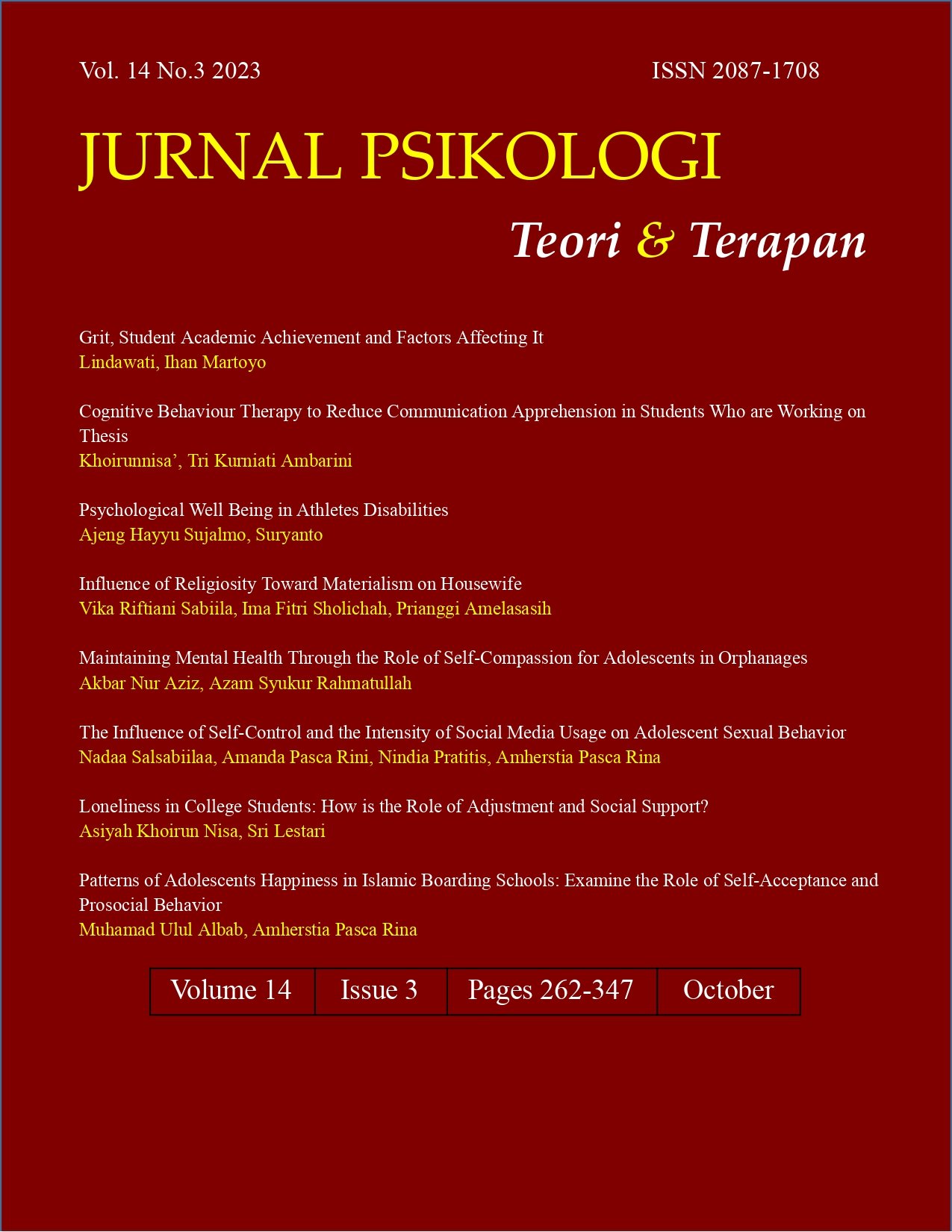Loneliness in College Students: How is the Role of Adjustment and Social Support?
DOI:
https://doi.org/10.26740/jptt.v14n03.p322-335Keywords:
Adjustment, College student, Loneliness, Social support, Young adult, Penyesuaian diri, Kesepian, Dukungan sosial, Dewasa awal, MahasiswaAbstract
Loneliness is one of the problems experienced by students because of the lack of social support and not being matched by the ability to adapt to the social environment. The purpose of this study was to empirically test the role of adjustment and social support together in loneliness. Two hundred students aged 18-25 in Solo Raya participated in this survey. The participants get through incidental sampling techniques. The instruments used were the loneliness, self-adjustment, and social support scales. Data were analyzed using multiple linear regression. The results show that adjustment and social support together affect loneliness. Partially self-adjustment and social support have an equal effect on loneliness in college students. The results of this study imply that the availability of social support from the immediate environment can help students overcome loneliness among students.
ABSTRAK
Kesepian menjadi salah satu problem yang dialami mahasiswa karena minimnya dukungan sosial dan tidak diimbangi dengan kemampuan untuk menyesuaikan diri dengan lingkungan sosial. Tujuan penelitian ini untuk menguji secara empiris peran penyesuaian diri dan dukungan sosial secara bersama-sama terhadap kesepian. Survei dilakukan kepada 200 mahasiswa usia 18-25 tahun di Solo Raya yang direkrut melalui teknik sampling incidental. Instrumen yang digunakan meliputi skala kesepian, skala penyesuaian diri, dan skala dukungan sosial. Analisis data yang digunakan yaitu regresi linear berganda. Hasil penelitian menunjukkan penyesuaian diri dan dukungan sosial secara bersama-sama berperan signifikan terhadap kesepian. Secara parsial penyesuaian diri dan dukungan sosial memiliki pengaruh yang setara terhadap kesepian pada mahasiswa. Implikasi hasil penelitian ini adalah ketersediaan dukungan sosial dari lingkungan terdekat dapat membantu mahasiswa untuk mengatasi kesepian pada mahasiswa.
References
Afifah, N. W. (2015). Hubungan antara penyesuaian diri dan kesepian pada mahasiswa baru perguruan tinggi swasta di Yogyakarta [Skripsi, Universitas Gadjah Mada]. http://etd.repository.ugm.ac.id/penelitian/detail/79392
Arnett, J. J. (2018). Adolescence and emerging adulthood a cultural approach (6th ed.). Pearson Education.
Azwar, S. (2019). Reliabilitas dan validitas (4th ed.). Pustaka Pelajar.
British Red Cross and Co-Op. (2016). Trapped in a bubble: An investigation into triggers for loneliness in the UK. British Red Cross Society. https://www.redcross.org.uk/-/media/documents/about-us/research-publications/health-and-social-care/co-op-trapped-in-a-bubble-report.pdf
Buchori, B. (2002). Penyesuaian diri dan motivasi (Revisi). Balai Aksara.
Fulton, L., & Jupp, B. (2015). Investing to tackle loneliness: A discussion paper. Social Finance. https://gulbenkian.pt/uk-branch/publication/investing-to-tackle-loneliness-a-discussion-paper/
Haber, A., & Runyon, R. P. (1984). Psychology of adjustment. The Dorsey Press.
Humairah, N. (2018). Hubungan penyesuaian diri terhadap kepercayaan diri mahasiswa semester awal fakultas ushuluddin dan humaniora Universitas Islam Negeri Antasari Banjarmasin [Skripsi, UIN Antasari]. https://idr.uin-antasari.ac.id/12551/
Juniastira, S. (2018). Hubungan antara dukungan sosial dan kualitas hidup pada pasien stroke. [Skripsi, Universitas Islam Indonesia]. https://dspace.uii.ac.id/handle/123456789/8391
Killgore, W. D. S., Cloonan, S. A., Taylor, E. C., & Dailey, N. S. (2020). Loneliness: A signature mental health concern in the era of covid-19. Psychiatry Research, 290, 113117. https://doi.org/10.1016/j.psychres.2020.113117
Michaelson, J., Jeffrey, K., & Abdallah, S. (2017). The cost of loneliness to UK employers. New Economic Foundation. https://neweconomics.org/2017/02/cost-loneliness-uk-employers
Myers, D. G. (2012). Psikologi sosial (10th ed.). Salemba Humanika.
Office for National Statistics. (2018, April). Loneliness - What characteristics and circumstances are associated with feeling lonely? Office for National Statistics. https://www.ons.gov.uk/peoplepopulationandcommunity/wellbeing/articles/lonelinesswhatcharacteristicsandcircumstancesareassociatedwithfeelinglonely/2018-04-10
Paramitha, R. (2018). Hubungan kesejahteraan psikologis dengan kesepian pada mahasiswa yang merantau di Yogyakarta [Skripsi, Universitas Islam Indonesia]. https://dspace.uii.ac.id/bitstream/handle/123456789/13606/SKRIPSI_RAISSA_14320236.pdf?sequence=2&isAllowed=y
Renken, E. (2020). Most americans are lonely, and our workplace culture may not be helping. NPR. https://www.npr.org/sections/health-shots/2020/01/23/798676465/most-americans-are-lonely-and-our-workplace-culture-may-not-be-helping
Santrock, J. W. (2012). Life-span development (Perkembangan masa hidup). Erlangga.
Sarafino, E. P. (1994). Health psychology: Biopsychosocial interactions (2nd ed.). PT. Cakra Indah Pustaka.
Sarafino, E. P. (2006). Health Psychology, Biopsychosocial Interaction, Fifth Edition. John Wiley & Son, INC.
Stanley, M. (2006). Buku ajar keperawatan gerontik. EGC.
Sugiyono, S. (2019). Metode penelitian kuantitatif. Alfabeta.
Sujarweni, V. W. (2014). SPSS untuk penelitian. Pustaka Baru Press.
Walsh, C. (2021). Young adults hardest hit by loneliness during pandemic. The Harvard Gazette. https://news.harvard.edu/gazette/story/2021/02/young-adults-teens-loneliness-mental-health-coronavirus-covid-pandemic/
Downloads
Published
How to Cite
Issue
Section
License

This work is licensed under a Creative Commons Attribution-NonCommercial 4.0 International License.
Authors who publish in this journal agree to the following terms:
Copyright in any article is held by the author.
The author grants the journal, publication rights with the work simultaneously licensed under a Creative Commons Attribution License that allows others to share the work with an acknowledgment of the work's authorship and initial publication in this journal.
Authors may enter into separate, additional contractual arrangements for the non-exclusive distribution of the journal's published version of the work (e.g., posting it to an institutional repository or publishing it in a book), with an acknowledgment of its initial publication in this journal.
Authors are permitted and encouraged to post their work online (e.g., in an institutional repository or on their website) prior to and during the submission process, as this can lead to productive exchanges, as well as earlier and greater citation of published work.
 Abstract views: 2081
,
Abstract views: 2081
, PDF Downloads: 1968
PDF Downloads: 1968


















